
Bookstores & Coffee Shops
Just blocks from the beach is the heart of downtown Ludington, where you can shop, dine, and enjoy summertime events.
Photo by Todd & Brad Reed Photography
The S.S. Badger is the last remaining example of the Great Lakes rail/car ferry design that influenced the design of such ferries around the world. The first open-water crossing on which railcars were carried onboard occurred on Lake Michigan. For nearly a century, railroad car ferries extended rail lines across three of the Great Lakes, especially Lake Michigan. During that period the difficulty of arranging trackage rights on roads, the distance around the southern end of the lake, and congestion in the rail yards at Chicago all made the transport of railcars across the lake a more efficient and economical alternative.

Sturgeon Bay, Wisconsin is the birthplace of the S.S. Badger, the last coal-fired steam powered passenger ship still sailing Lake Michigan. Built in 1951 by the Christy Corporation, the Badger was commissioned by the Chesapeake and Ohio railroad company at a cost of five million dollars. It was named in honor of the mascot at the University of Wisconsin and was the second ship launched in 1952, after the S.S. Spartan.
Mrs. Walter J. Kohler, Jr., wife of the Wisconsin governor, christened the Badger on September 6, 1952. Captain Bernard Robertson was named as the master of the new trainferry. Primarily built to carry railroad cars across the lake, the Badger was considered a trainferry, rather than a carferry. The Badger’s maiden voyage to Ludington, Michigan took place on March 21, 1953, carrying paper from the Wisconsin Paper group. It was the largest carferry ever built, capable of traveling a maximum speed of 24 mph. In the earlier years, the carferries traveled year ’round between Wisconsin and Michigan, battling the high waves and ice. But both steam ships had trouble with winter ice in February of 1963, and the Badger was docked due to a coal strike late in 1971.
The Badger had one Michigan port, Ludington, but three Wisconsin ports: Manitowoc, Milwaukee, and Kewaunee. It left Milwaukee for the last time on October 24, 1980, ending service at that time, but under an MDOT subsidy, resumed its travel to Milwaukee in June of 1981.
With the railroad freight business dwindling, it looked as if the carferries were headed for the scrapyard. C&O dropped both the Milwaukee and Manitowoc runs, and even offered to give the boats away. Finally in 1983, in order to save the ships, Glen Bowden and a group of Ludington businessmen bought all three carferries- the Badger, Spartan, and City of Midland… for one dollar each. Their new company, called the MWT (Michigan-Wisconsin Transportation), struggled to keep the ships going, but in 1990 the carferries were permanently docked, with the fear that they would never sail again. It was a sad time for the area where, at one time, nine carferries sat in port.
In yet another heroic move, Holland, Michigan resident Charles Conrad purchased all three ships in 1991 and renamed the company Lake Michigan Carferry. Service was established between Ludington and Manitowoc for the S.S. Badger, which was rededicated in 1992 as a non-railroad carferry. Mr. Conrad invested $1.5 million into the Badger, readying her for passenger cruise service during the summer months. They had hoped for 80,000 passengers that first season, but ended up with 115,000.
In 2013, the S.S. Badger became the target of the United States Environmental Protection Agency due to concerns over the dumping of coal ash into Lake Michigan. It seemed, at that time, that the carferry may be permanently docked unless action was taken. In a proactive move, the carferry’s ash retention system and combustion controls were upgraded to stop the discharge of ash into Lake Michigan, with a price tag of $2.4 million. Due to this improvement, a federal judge granted permission for the ferry operation to continue.
*See below for more information about Historical Landmarks
On February 18, 2016, the Department of the Interior announced the designation of the S.S. Badger carferry as a National Historic Landmark. The designation recognizes the Badger’s exceptional value and quality in illustrating an aspect of American transportation technology in the mid-twentieth century.
“The SS Badger is a unique example of American ingenuity in transportation that has been crucial to our country’s economic development over the last century,” said National Park Service Director Jonathan B. Jarvis. “As the National Park Service celebrates its centennial anniversary, we look forward to a second century of helping preserve the more than 2,500 historic places and objects like the Badger that bear the distinction of being National Historic Landmarks.”
At the end of 2020, it was announced that the S.S. Badger, the Articulated Tug-Barge Undaunted-Pere Marquette 41, and the SS Spartan (a sister ship to the Badger that’s currently not in operation) had been purchased by Interlake Holding Company, based in Ohio. The company shares the culture of putting its employees and customers first, making the purchase a good fit, and the S.S. Badger is expected to continue it’s journey for many years to come.
National Historic Landmarks (NHLs) are historic resources that illustrate the heritage of the United States. NHLs come in many forms: historic buildings, sites, structures, objects, and districts. Each NHL represents an outstanding aspect of American history and culture.
The National Historic Landmarks program, established in 1935, is administered by the National Park Service on behalf of the Secretary of the Interior. The agency works with preservation officials, private property owners, and other partners interested in nominating properties for National Historic Landmark designation. Completed nominations are reviewed by the National Park System Advisory Board, which makes recommendations for designation to the Secretary of the Interior. If selected, property ownership remains intact but each site receives a plaque and technical preservation assistance.
Additional information on the program can be found at nps.gov.
The 410′ S.S. Badger is the largest carferry to sail the Great Lakes, and can carry 620 passengers and 180 autos. It travels at roughly 18 mph to make the four-hour trip, with nearly 490 crossings per year. On board are 40 staterooms, outside deck, snack bar, video arcade, gift shop, TV and movie lounges, and children’s playroom. In 1997, the Badger was officially named a Registered Wisconsin Historic Site, and in 2002, was named Ship of the Year by the Steamship Historical Society of America. In 2009, the Badger was placed on the National Register of Historic Places by the U.S. Department of Interior. And in 2016, the S.S. Badger finally gained its status as a National Historic Landmark…almost five years after Lake Michigan Carferry’s initial application.
It started with the Ann Arbor I in the early 1900s–and 13 carferries later–the S.S. Badger still sails from Ludington, Michigan to Manitowoc, Wisconsin from mid-May to mid-October. It is as symbolic to Ludington as our lighthouses, and a beloved sight to watch.
Ludington: 701 Maritime Drive, Ludington, Michigan 49431
Manitowoc: 900 South Lakeview Drive, Manitowoc, Wisconsin 54220
(800) 841-4243

Just blocks from the beach is the heart of downtown Ludington, where you can shop, dine, and enjoy summertime events.
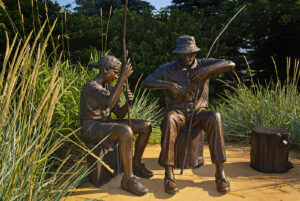
The bronzed sculptures in Ludington’s 5-acre Waterfront Park sets it apart from other parks. The park is situated on the Lake Michigan inlet.
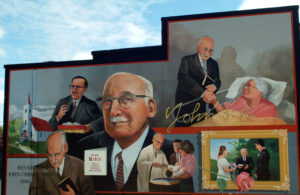
Within the downtown Ludington region, several murals grace the façades of local area businesses, telling stories of the area’s rich history.
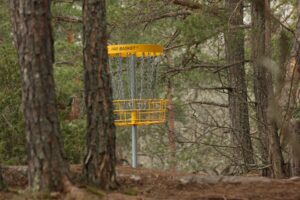
Disc golf is a big deal here in the Ludington area, with up to 20,000 people per year visiting one of our six courses.

Children can create, explore, and discover by playing with the numerous variety of exhibits of Sandcastles Children’s Museum.
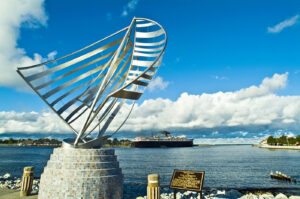
The Mason County Sculpture Trail was launched in 2012 and includes nine sculptures in Ludington, Scottville, and Fountain.
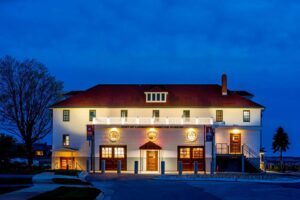
Ludington is home to several different museums for people of all ages! Highlighting our area’s careers, businesses, history, and culture!
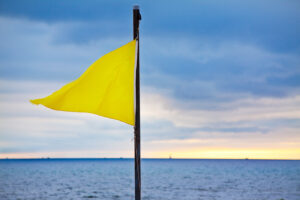
West Michigan weather – they say if you don’t like the weather in Ludington, wait a few minutes and it will change.
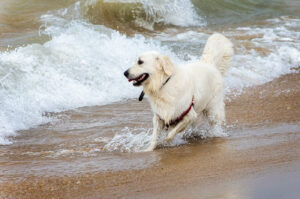
Your pet should feel right at home in Ludington. There are many businesses that allow pets and parks and beaches for them to play on.
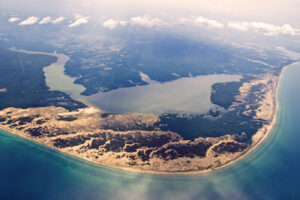
The aerial view of Big Sable Point features Hamlin Lake, Ludington State Park, and Big Sable Point Lighthouse on Lake Michigan.
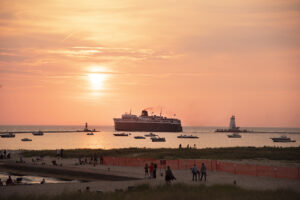
Enjoy a variety of shoreline cruises with various themes on the S.S. Badger Carferry in both Ludington and Manitowoc.
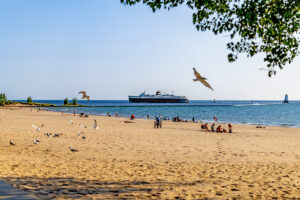
The S.S. Badger Carferry is a fun and relaxing shortcut across Lake Michigan between Ludington, Michigan and Manitowoc, Wisconsin.
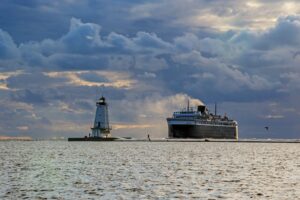
Traveling to Ludington on the Lake Michigan Carferry? Here are some helpful hints for your arrival into Port Ludington on the S. S. Badger.
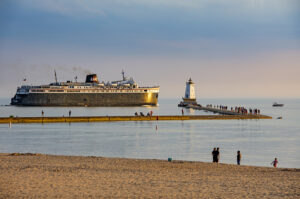
Where’s the best place to watch the S.S. Badger arrive or depart Ludington? Here are great locations for viewing the Lake Michigan Carferry.
| Cookie | Duration | Description |
|---|---|---|
| cookielawinfo-checkbox-advertisement | 1 year | Set by the GDPR Cookie Consent plugin, this cookie records the user consent for the cookies in the "Advertisement" category. |
| cookielawinfo-checkbox-analytics | 1 year | Set by the GDPR Cookie Consent plugin, this cookie records the user consent for the cookies in the "Analytics" category. |
| cookielawinfo-checkbox-functional | 1 year | The GDPR Cookie Consent plugin sets the cookie to record the user consent for the cookies in the category "Functional". |
| cookielawinfo-checkbox-necessary | 1 year | Set by the GDPR Cookie Consent plugin, this cookie records the user consent for the cookies in the "Necessary" category. |
| cookielawinfo-checkbox-others | 1 year | Set by the GDPR Cookie Consent plugin, this cookie stores user consent for cookies in the category "Others". |
| cookielawinfo-checkbox-performance | 1 year | Set by the GDPR Cookie Consent plugin, this cookie stores the user consent for cookies in the category "Performance". |
| CookieLawInfoConsent | 1 year | CookieYes sets this cookie to record the default button state of the corresponding category and the status of CCPA. It works only in coordination with the primary cookie. |
| elementor | never | The website's WordPress theme uses this cookie. It allows the website owner to implement or change the website's content in real-time. |
| rc::a | never | This cookie is set by the Google recaptcha service to identify bots to protect the website against malicious spam attacks. |
| rc::c | session | This cookie is set by the Google recaptcha service to identify bots to protect the website against malicious spam attacks. |
| viewed_cookie_policy | 1 year | The GDPR Cookie Consent plugin sets the cookie to store whether or not the user has consented to use cookies. It does not store any personal data. |
| Cookie | Duration | Description |
|---|---|---|
| _ga | 1 year 1 month 4 days | Google Analytics sets this cookie to calculate visitor, session and campaign data and track site usage for the site's analytics report. The cookie stores information anonymously and assigns a randomly generated number to recognise unique visitors. |
| _ga_* | 1 year 1 month 4 days | Google Analytics sets this cookie to store and count page views. |
| _gat_UA-* | 1 minute | Google Analytics sets this cookie for user behaviour tracking.n |
| _gid | 1 day | Google Analytics sets this cookie to store information on how visitors use a website while also creating an analytics report of the website's performance. Some of the collected data includes the number of visitors, their source, and the pages they visit anonymously. |